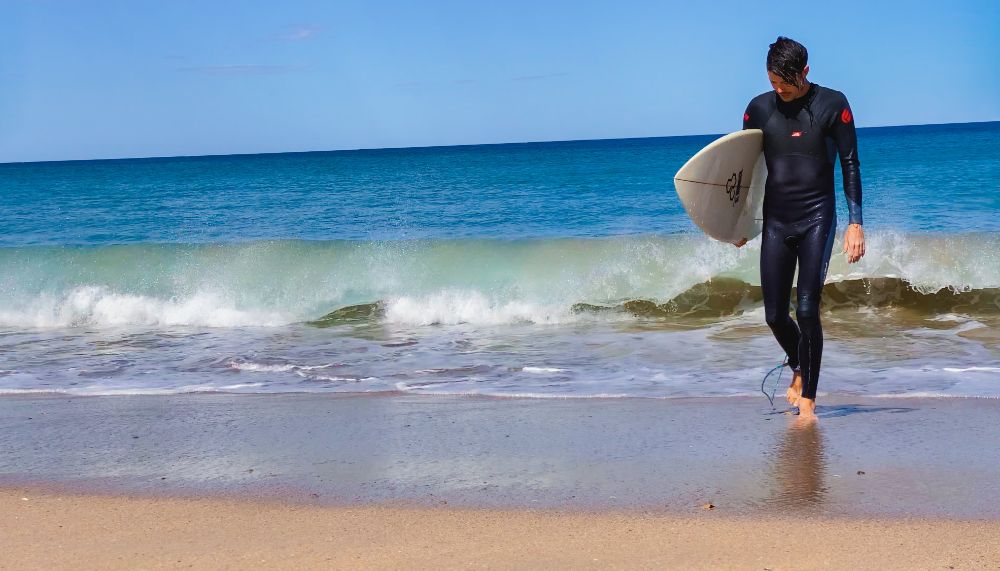If you're looking at get into surfing or if you've recently been to the beach and see a lineup full of surfing in full body black suits you may be wondering why do surfers wear wetsuits?
Is this something that's required for surfing? Do they provide safety or performance enhancement or do they just keep surfers warm.
As someone who's surfing for nearly 20 years in all different climates the answer is pretty simple:
Surfers wear wetsuits to keep them warm. Wetsuits have insulating neoprene foam that keeps the surfer warm and allows them to surf for longer periods in cold water. Wetsuits aren't required for surfing and they aren't performance enhancing, they actually make paddling harder.
There are a variety of different wetsuit options out there from singlet style insulated vests all the way up to the thick full body suits (called “steamers”). Each is designed to keep a surfer warm and which one you wear depends on the water temperature as well as the wind chill factor.
In this article we'll look at a bunch of benefits of wearing a wetsuit to help explain why surfers wear them. We'll also look at some of the downsides of wetsuits and reasons you may not want to wear them when surfing.
1. Wetsuits Keep You Warm
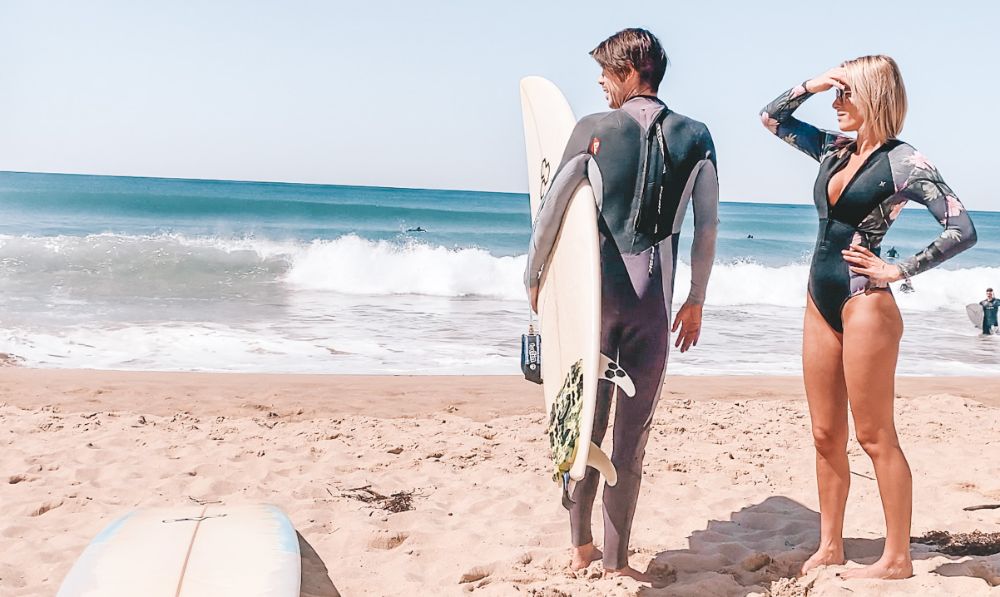
Let me be extremely clear, warmth is the major reason surfers wear wetsuits and if given the choice 99.9% of surfers would opt to not wear a wetsuit if they don't have to.
Wet suits are made from neoprene foam, which is rubber filled with thousands of tiny nitrogen air bubbles.
This traps in the surfers body heat and keeps out the cold water temperature.
Wetsuits are tight to allow just a thin layer of water into the suit. This water is easily heated up by the body and doesn't have a huge impact on the surfer's core body temperature.
Trying to surf in freezing cold water without a wetsuit strips you of your strength and energy and can lead to hypothermia if you aren't careful.
If you're in a warm tropical climate in water temperatures above 72ºF (22ºC) then chances are you'll be fine without a wetsuit and a wetsuit will actually make you too hot.
Once the water temperature gets to around 62-68ºF (16-20ºC) you'll likely want a full body wetsuit. Thicknesses vary with thicker wetsuits keeping you warmer while thinner ones not being as insulating.
Talking about the right type and thickness of wetsuit would take an entire article, but here is a handy quick guide to get your started.
| Water Temp Range ºF (ºC) | Wetsuit Thickness | Recommended Wetsuit Type | Seal Type |
|---|---|---|---|
| >72ºF (>22ºC) | N/A | Rashguard | N/A |
| 65-75ºF (18-24ºC) | 0.5 – 2/1 mm | Top / Spring Suit / Shorty / Short John | N/A |
| 62-68ºF (16-20ºC) | 2 – 3/2 mm | Spring Suit / Steamer (Full Suit) | Flatlock |
| 58-63ºF (14-17ºC) | 3/2 – 4/3 mm | Steamer, Boots | Sealed |
| 52-58ºF (11-14ºC) | 4/3 – 5/4/3 mm | Steamer, Boots, Gloves, Hood | Sealed + Taped |
| 43-52ºF (6-11ºC) | 5/4 – 5/4/3 mm | Steamer, Boots, Gloves, Hood | Sealed + Taped |
| <42ºF (<6ºC) | 6/5 – 7 mm | Steamer, Boots, 3 Finger Gloves, Hood | Sealed + Taped |
If you're finding you're getting cold in your wetsuit then check out my article on how to stay warm in a wetsuit or my article on what to wear under a wetsuit for extra warmth.
2. Wetsuits Protect You Against Rocks, Reefs and Boards
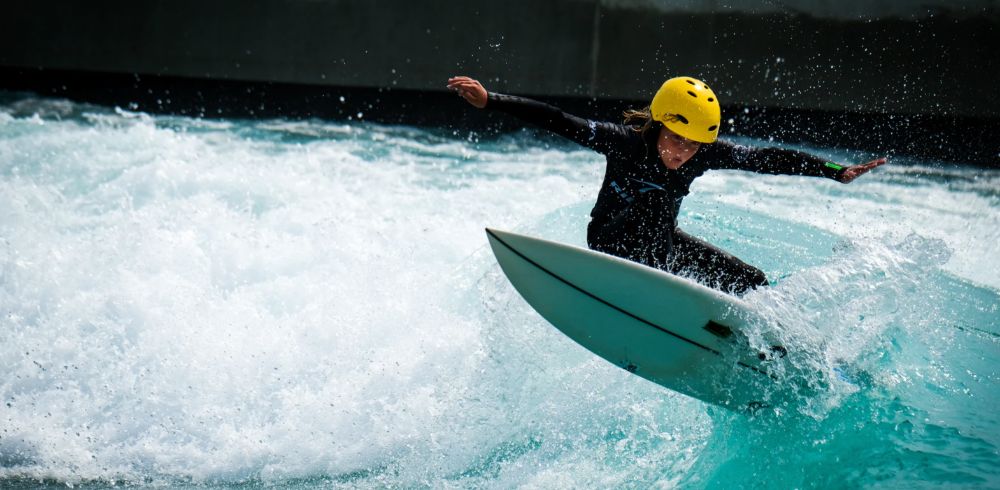
Well not the primary reason for wearing wetsuits it definitely is an added benefit for surfers riding waves at more dangerous breaks.
Some of the best waves break directly onto low lying rocks or shallow reef's and a wipe out on one of these waves can see your body scraping along the rocks or the reef.
Wearing a wetsuit gives you a layer of protection that means your skin is less likely to get carved up even if you crash into the rocks or the reef.
Many times surfing the local point near my house I have ripped wet suits on the rocks during a wipe out which ruined my wetsuit but protected my skin.
Some surfers wear helmets for extra protection too, but this is not very common.
3. Wetsuits Provide UV Protection
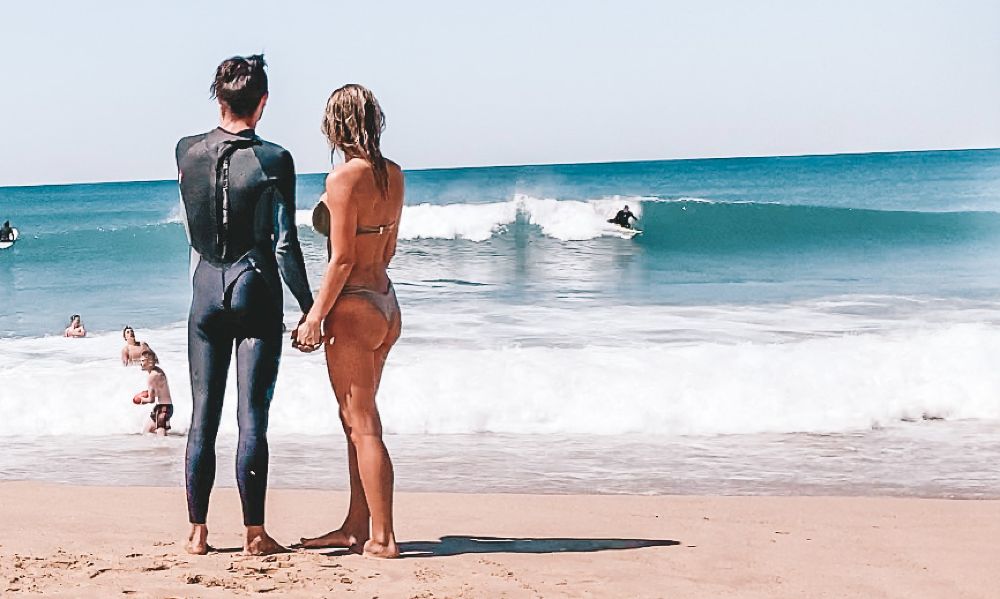
Most wetsuits are made out of neoprene which are then infused with carbon black, making them black in appearance.
The carbon black adds strength to the neoprene but black as a color also absorbs the most UV rays which means those harmful rays are more likely to be absorbed by your wetsuit and less likely to get through to your skin and burn you.
Having a black wetsuit also means it absorbs more of the sun's heat energy which helps to keep you warmer in the water on sunny days.
4. Wetsuits Prevent Board Rash
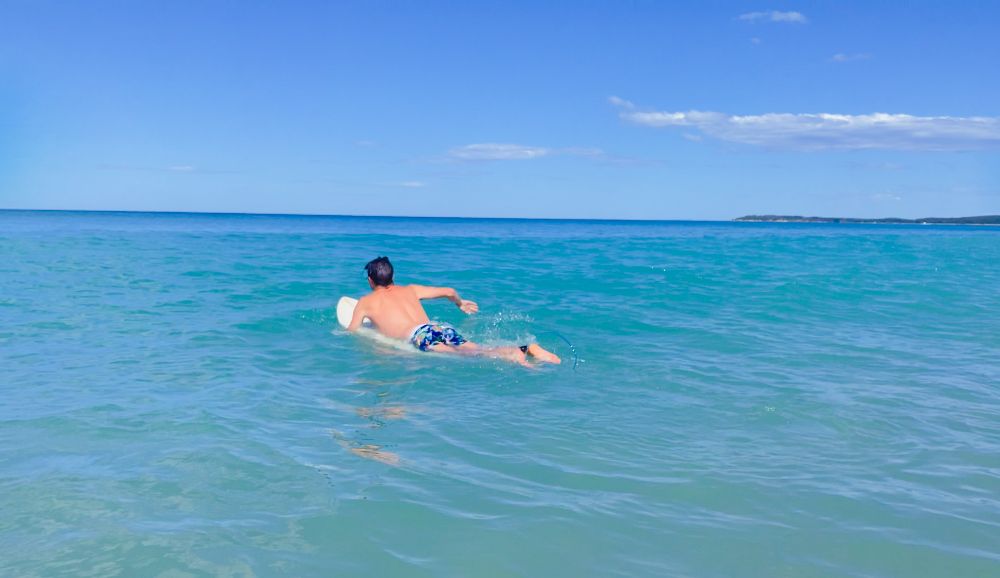
This is especially true with foam boards but it can also happen with fiberglass boards as well.
When you're paddling you arch your back in such a way that your ribs tend to push down into your board.
If you're not wearing a wetsuit or rash vest then your ribs stomach and chest can get a rash from your surfboard.
However, if you're wearing a wetsuit then you have a layer of protection between you and your board. Your wetsuit rubs on the board but your skin stays protected and minimizes board rash.
Wetsuit can also cause rashes but that's a whole other story.
5. Some Surfers are Sponsored
Some surfers are good enough that companies want to sponsor them. After all, who wouldn't want to wear the same wetsuit as their favorite pro surfer.
Seeing a pro surfer wearing a certain wetsuit brand is an endorsement of that brand and makes you more likely to purchase it.
So some surfers are actually paid to wear wetsuits.
But again the primary reason is warmth. The same surfer might wear that brand board shorts or rash vest in warm water instead of a wetsuit.
6. Wetsuits Make You More Buoyant
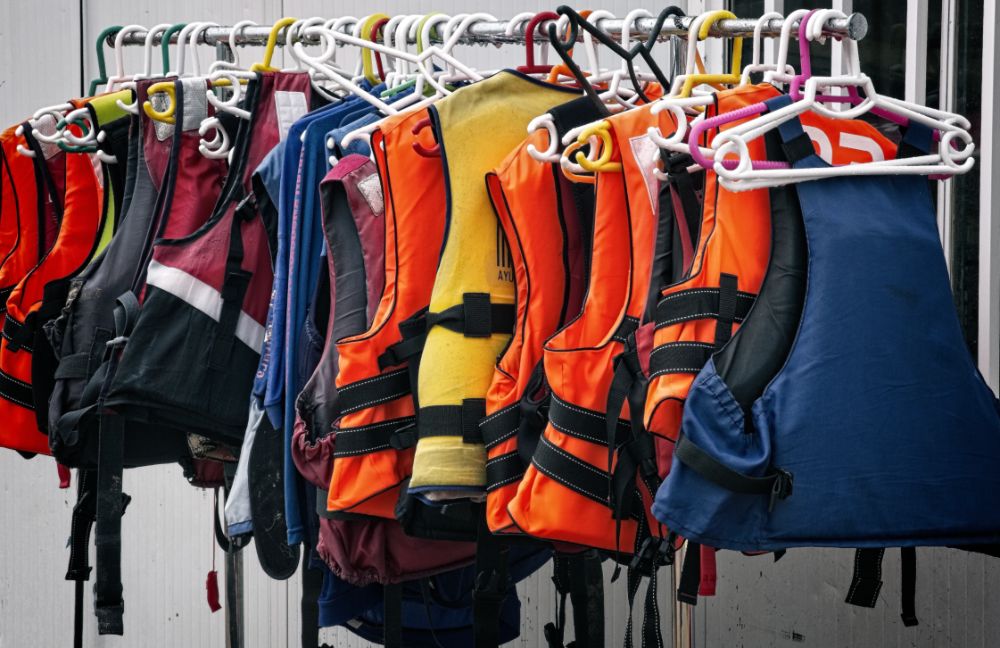
This isn't really a reason that surfers wear wetsuits but it is one of the minor benefits of having a wetsuit.
The neoprene rubber foam that wetsuits are made out of contain thousands of tiny little nitrogen air bubbles. This makes the wetsuit buoyant in the water and when wearing it you float slightly better as a surfer.
However, wetsuits restrict your movement and make swimming and paddling harder so this kind of counteracts the increase buoyancy and it really isn't needed for another except big wave surfers, and they use life jackets when surfing anyway.
Do You Need To Wear a Wetsuit To Surf?
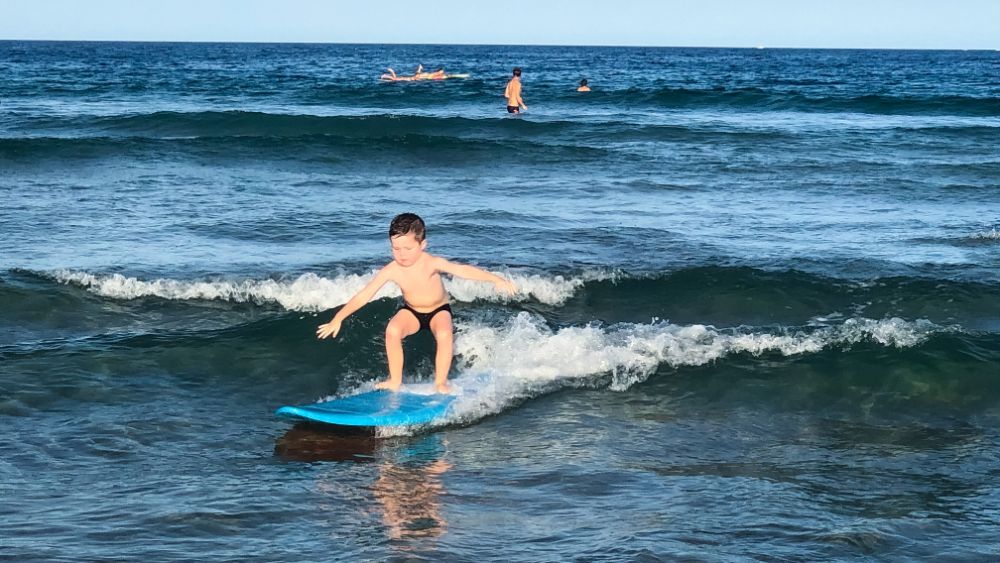
So many surfers wear wetsuit that you might think it's some sort of requirement to surfing or there is some major reason surfers wear them.
The truth is very different:
You do NOT need to wear a wetsuit to surf. Wetsuits actually make paddling and movement harder. Wetsuits are just worn to keep surfers warm. If the water is warm enough or you don't feel the cold then surfing in board shorts or swimmers is also fine.
When the water is extremely cold chances are you will need to wear a wetsuit when surfing otherwise the water will sap you of all your energy and make you shivering and cold.
The Negatives of Surfing in a Wetsuit
So there you have a few of the reasons people wear wetsuits when surfing. It's not required but they do keep you warm and have some other minor benefits as well.
But what above the negatives? What are the cons of wearing a wetsuit when surfing?
Harder to paddle
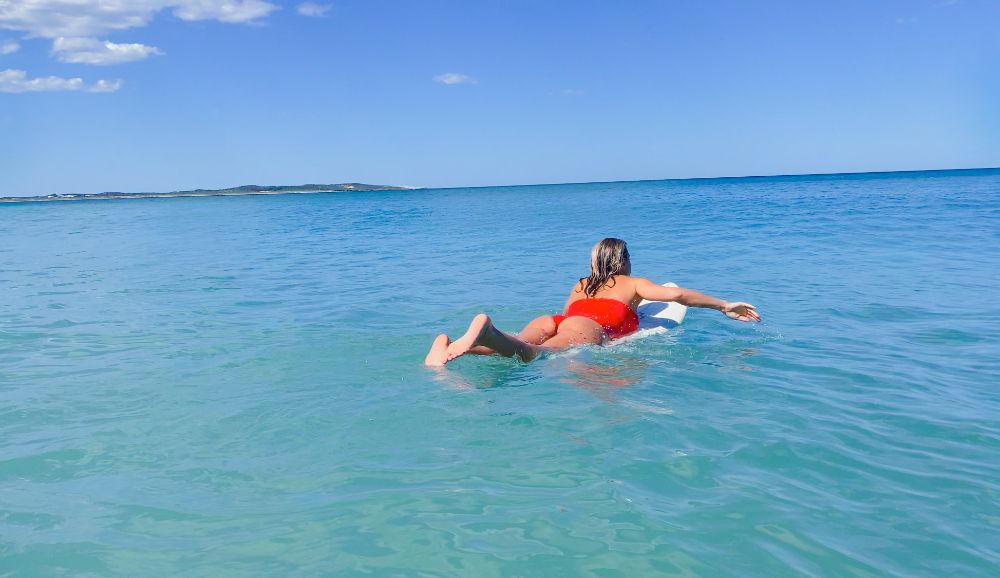
Surfing with a wetsuit makes it harder to paddle.
When you're wearing a tight body suit made of thick foam that fills up with water it makes moving your arms harder.
While surfing wetsuits are designed to be thinner and more flexible in the arms they still make paddling hard and more difficult.
This is why in warmer water people will often opt for no wetsuit.
Rashes
Oof! There's nothing worse than wetsuit rashes when the waves are good and you want to be out there.
Wetsuit can rub on your body giving you rashes under your arms, on the back of your legs or even in the groin region which is never fun.
A good well fitting wetsuit generally avoids most rashes but sometimes they just happen and you need time out of the water for them to heal.
Too hot
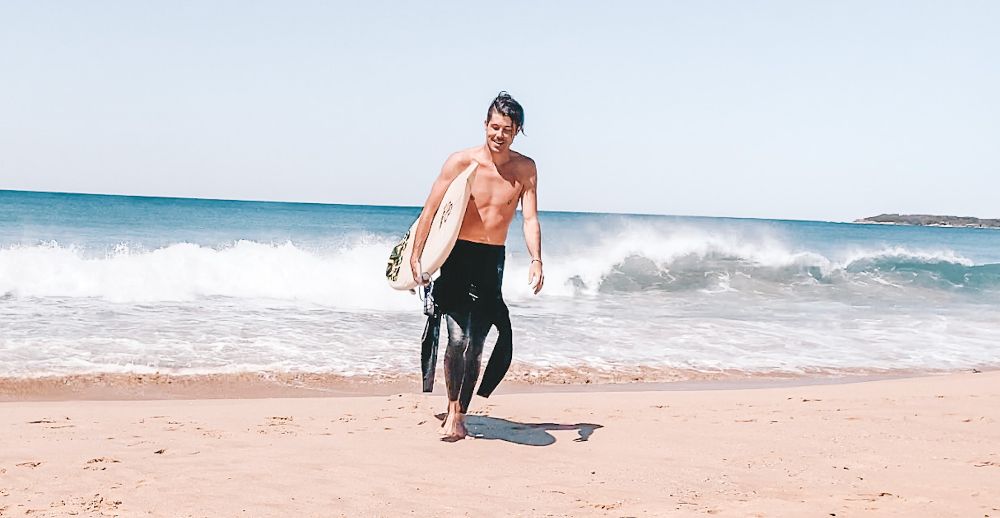
Wearing the wrong wetsuit for the water temperature can actually make you too hot.
Neoprene is insulating and while wetsuits don't keep you dry they do keep you extremely warm.
Wearing a full length thick wetsuit into the water in the middle of summer is a sure fire way to end up hot and frustrated.
Sometimes flushing water through your wetsuit helps but it's better to just wear the right wetsuit for the season.
Ball constriction
Wetsuits are made to be TIGHT so not much water can get in. This keeps you warmer but it also can create a suction on areas you don't want to be sucked in.
Often I'll be out in the water and my wetsuit has vacuum sealed to my balls which can be quite painful.
I'll need to flush cold water down there just to loosen up that area and give me some breathing space.
Expensive af
While wetsuits have gotten much cheaper than they used to be they are still super expensive. You're looking at hundreds of dollars for a basic wetsuit and to get a really good one your often looking at many hundreds of dollars.
Recently I needed to buy 3 wetsuits (one for each of my kids) and man did it break the bank.
Then recently my wetsuit completely broke (it was going on 10 years old) and I have to wait to buy one because I can't afford a new one just yet.
Hard to take on and off
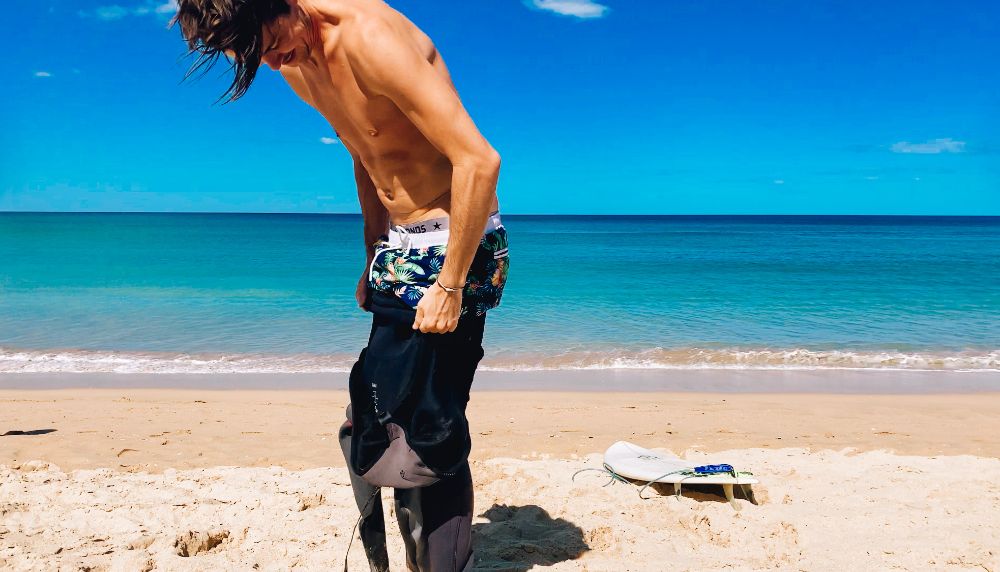
Wetsuits need to be extremely tight to work properly and higher performing wetsuits now use front zips or some are even zipperless which makes them extremely difficult to get in and out of.
I've heard stories of guys needing to go home and have their wives peel them out of their wetsuits or one of my dad's friends actually had to be CUT OUT OF HIS WETSUIT because it was so tight.
While the wetsuits with back zippers aren't as warm and let in more water I like them for the convenience of getting them on and off.

